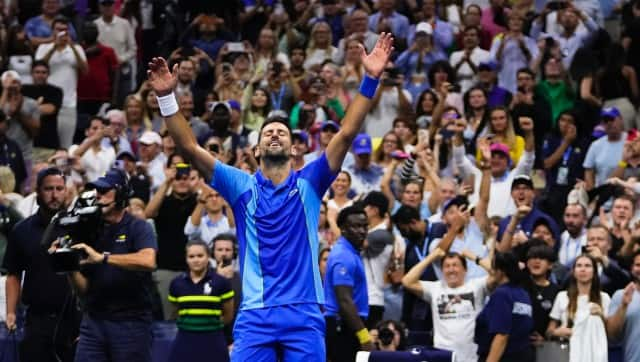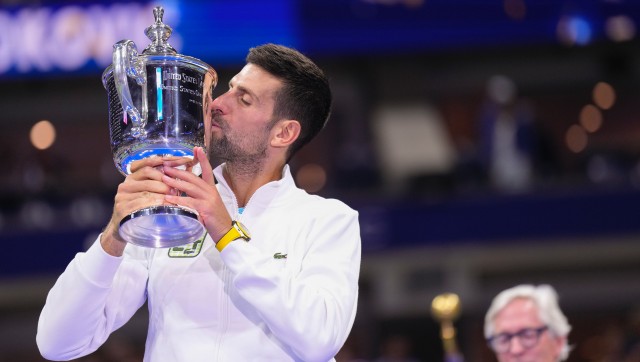Novak Djokovic changed into a white jacket with ‘24’ written in green font after lifting the US Open trophy on Sunday. The combination suggests it was more fitting for Wimbledon and maybe it was meant to be used at the All England Club. But, on that day, Carlos Alcaraz produced a magical act to deny the Serb. Daniil Medvedev, who had also scripted the unthinkable at this stage, at this venue, against the same opponent in 2021, however, couldn’t replicate the Spaniard’s bravado. Novak Djokovic would win his fourth US Open on Sunday and 24th Grand Slam title overall. It takes him level with Margaret Court in list of all-time most major titles. In the Open Era, he has the most major titles — surpassing Serena Williams. At 36, Djokovic also became the oldest US Open men’s winner in the Open Era. Maybe the most staggering statistic is this: Djokovic has now won a third of the Grand Slams he’s ever played. The Serb has contested 72 majors and won 24 of them. To make it even mindboggling, he had won just one major after playing 24 of them. So, in the last 48 major appearances, Djokovic has won 23 of them - almost half.
His 24th Grand Slam title was as much about his mental toughness as about his physical prowess. And Daniil Medvedev was expecting it to be the case. “Novak, when he loses, he’s never the same after,” Medvedev said before the final. “He’s different. It’s just a different mentality." “He’s going to be 10 times better than he was that day,” Medvedev said comparing to the 2021 US Open final. “And I have to be, if I want to beat him, 10 times better than I was that day.” Djokovic was a complete opposite of the man that occupied the court in 2021. That evening, the Serb was occupied by the chase of a calendar year Grand Slam and was reduced to tears as the dream was shattered. This time around, he found a solution to every challenge. “I really did my best in the last 48 hours not to allow the importance of the moment and what’s on the line get to my head,” Djokovic said Sunday, “because two years ago that’s what happened, and I underperformed.”
Essentially, the win was all about the 104-minute second set. In the first and second, Djokovic capitalised on single breaks of serve to get the job done. The one-hour-and-44-minute set was a treat for the packed Arthur Ashe Stadium. On the court, it was a real tussle and both players were unwilling to give an inch. Rallies stretched to 20, 25, 30 shots and the rupturous applause was accorded to both players. Medvedev described the duel as “arm wrestling”. At one point, they engaged in a 32-stroke point. Djokovic sent a backhand into the net and fell to his back and stayed down with chest heaving. The crowd applauded and roared. Novak, one of the fittest players on the tour still, sat up but remained on the ground for a bit. The crowd kept cheering and saluted the entertainment on offer. Each time Medvedev looked to have had the better of Djokovic, he would get up and go on. The Serb would use his racket for support after lengthy rallies or pause to stretch his legs. “That’s Novak,” Medvedev said. “No matter what, he can be there.” “I don’t think I have ever played a longer set in my life,” Djokovic said.
For Medvedev, the story might have been different if he had taken the second set. The 27-year-old had set point while returning at 6-5. Djokovic rushed to the net on serve, Medvedev went cross-court, instead of the open down the line pass, and Novak had it covered. In the tiebreaker that followed, Medvedev came within two points of clinching it (at 5-4) before Novak reeled off three points in a row. “Should have won it,” Medvedev said of the second set while admitting there was regret, “but sometimes tennis is not that easy. Passing shot for sure down the line, not cross, but I have two choices and I chose the wrong one.” One adjustment that Djokovic made to keep going was play short points. He won 20 of 22 points by serve-and-volley and 37 off 44 points at the net. [caption id=“attachment_13111412” align=“alignnone” width=“640”] Novak Djokovic won his fourth US Open title on Sunday when he beat Daniil Medvedev in the final. AP[/caption] When it was all over, Djokovic flung his racket, put his arms up, knelt on the court and bowed his head. Then, he found his daughter, son and wife along with his parents and team. What’s the ceiling? There is none. “I don’t put any number right now in my mind on how many Slams I want to win until the end of my career. I don’t really have any number,” said Djokovic. “I’ll continue to prioritise them as my most important tournaments and where I want to play the best tennis. “So that will not change. That will stay the same in the next season or I don’t know how many more seasons I have in my legs. So let’s see.”
Novak Djokovic won his fourth US Open title on Sunday when he beat Daniil Medvedev in the final. AP[/caption] When it was all over, Djokovic flung his racket, put his arms up, knelt on the court and bowed his head. Then, he found his daughter, son and wife along with his parents and team. What’s the ceiling? There is none. “I don’t put any number right now in my mind on how many Slams I want to win until the end of my career. I don’t really have any number,” said Djokovic. “I’ll continue to prioritise them as my most important tournaments and where I want to play the best tennis. “So that will not change. That will stay the same in the next season or I don’t know how many more seasons I have in my legs. So let’s see.”
On Monday, he returned to World No 1 for a record-extending 390th week with Alcaraz vacating the spot following a semi-final run. The Spaniard was the only player to beat Djokovic in a major this year. And Medvedev was the only player to beat Djokovic on a hard court (in Dubai). Just when the Wimbledon final and the loss to Alcaraz felt like the passing of the torch, Djokovic has made clear he’s going nowhere: first in Cincinnati and now in New York.
“Occasionally asking myself, why do I need this still at this stage after all I have done, you know? How long do I want to keep going? I do have these questions in my head, of course,” he said. Australian Open has been Djokovic’s happy hunting ground — where he’s won 10 titles — and could assume 25th Grand Slam title to go over and above everyone in tennis history. “He just enjoying, he likes the challenges. Like you ask me 25, yeah, if he wins 25, he’s going to think, If I win 25, why not 26? It’s always one more, something more,” said his coach Goran Ivanisevic. Medvedev joked it’s about time Djokovic moved on and let someone else win some silverware. “I’m going to keep going. I feel good in my own body. I still feel I’ve got the support of my environment, of my team, of my family,” Djokovic said later. “Knowing that I play at such a high level still, and I win the biggest tournaments … I don’t want to leave this sport if I’m still at the top.”
Tanuj Lakhina wishes there were more hours in the day for sports to be played and watched.
)